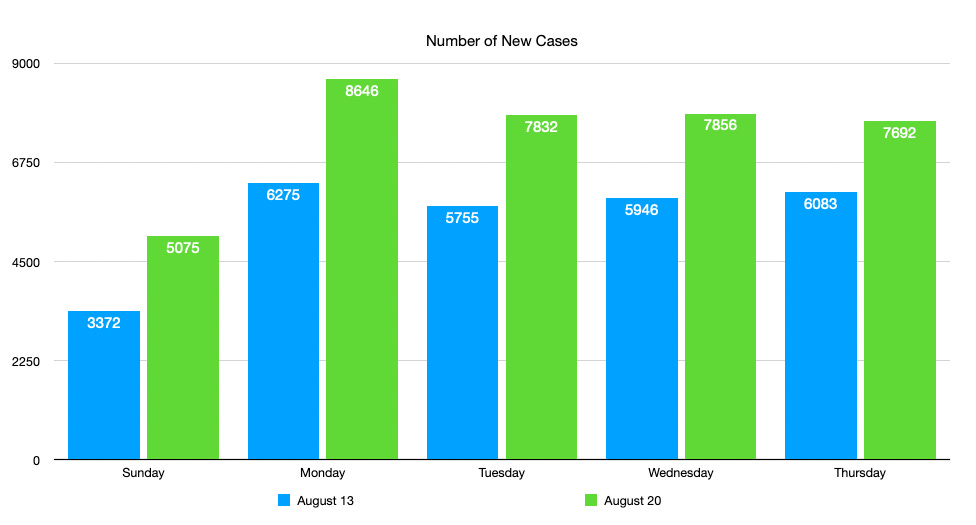Israel Update Week Ending August 20th
Money to Gaza, Fires, Covid, Bennet Invited, Afghanistan and the Economy
DEFENSE
Last night (August 19), Defense Minister Gantz confirmed that an agreement had been reached to provide money from Qatar to Gaza. No longer will Hamas be given cash to distribute. Instead, Qatar will transfer money to the UN in New York, which will transfer those funds to Ramallah into a Palestinian Authority account. The PA will then forward the transfer to a Gaza bank, and that bank will distribute cash to 100,000 families. Israel will have the right to review the list of intended recipients. Reports disclose that the agreement was attained by Defense Minister Gantz, at a secret meeting with Qatari officials, in a third nation. Hopefully, this will be the first step in a long-term agreement with Hamas in Gaza, however, many factors may influence that hopeful outcome. Meanwhile, the IDF did not respond to a lone missile fired from Gaza into Israel this week.
On our northern front … According to Arab sources, Israel struck Syria twice this week. The first time strike used ground-to-ground missiles to attack an installation close to the border. Then, last night (Thursday), Israel is reported to have attacked near Damascus. It was just announced that a Syrian anti-aircraft missile missed the planes (like so far they all have) and landed in the Judean Desert.
One of the major election promises made by Avigdor Lieberman was to raise the pay of conscripts during their mandatory service, which has not gone up in six years — and depending on where they serve, might earn under $400 a month. Given that the cost of living in Israel is very high, that nominal sum is not nearly enough to meet the basic needs of most soldiers. Despite Lieberman's pledge, the new budget does not include any additional money for conscripts. The new budget does, however, increase the already generous pension provided to retired senior officers. Military correspondent for Walla, Amir Bohbot, has been running a one-person campaign to embarrass the military, by publicizing the negative bank balances of dozens of Israelis soldiers.
FOREIGN RELATIONS
Prime Minister Bennett received two invitations this week. The first, from visiting Egyptian General Intelligence Directorate Chair, Abbas Kamel, who invited the new PM to visit Cairo in the coming weeks. That invitation occurred as part of talks to reach an agreement over Gaza.
The second invitation was extended by the White House. Bennett’s meeting with President Biden is scheduled to take place next week, on August 26. Bennett will be the first foreign leader to meet Biden, since the fall of Afghanistan. The expectation is that Biden will roll out the red carpet, to ensure the meeting goes well. Both leaders have reasons to announce their new personal friendship that has developed. With Iran negotiations seemingly on the back burner, one potential point of contention is, for the moment, off the table.
AFGHANISTAN
As I finished writing the newsletter last week, things were already looking bad in Afghanistan. In the following 24 hours, the situation went from bad, to tragic. I shared some of my opinions on the events that transpired during my weekly radio appearance, (which you can hear here), as well as my appearance on ILTV, where I also discuss the matter.
I expect to write several longer pieces on the subject over the next week, but here are a few initial observations: First, the Taliban victory is a medium and long-term problem for Israel. The fact that fanatical Islamists were able to defeat the United States, and a coalition of western countries, will serve to strengthen the most radical elements in the Muslim world. Those whose underlying ideology is religious-based, like Hamas, will be even more convinced that time is on their side, i.e., that we will one day tire and disappear, as Americans did in Afghanistan. On a broader level, the events of the past week weaken Americans throughout the world — and what weakens America also weakens Israel. Talking to a friend (a retired Israeli General) who knows the American army well (as a former attendee of the US Army War College), he was shocked at the military's lack of preparedness for the contingency that emerged.
FIRE
This week, the largest forest fire (since the Carmel fires a decade ago) raged in the forest along the road to Jerusalem. Whole areas burned and an entire ecosystem was lost. However, thanks to the Herculean efforts of the Israeli Fire Department — including the first-ever use of an actual Hercules aircraft from the Air Force — the fires were brought under control before they could damage any communal settlements.
Israel had begun to ask for assistance from neighbors, all of whom, including Turkey, pledged to assist. The only help that arrived before the flames were extinguished was from our closest neighbor, the Palestinian Authority. In the aftermath of the fire, the right-wing claims the blaze was arson, while the left-wing blames global warming. The investigation is not yet complete, so for now, we will have to leave the discovery of the cause to the investigators. Though one thing is clear, the fire, whether started intentionally or not, was aided by the fact that Israel, like much of the world, is experiencing one of its warmest summers on record.
COVID-19
Israel continues to experience one of the world’s largest outbreaks of the Covid-19.
The numbers keep rising week-to-week — both in terms of the numbers of those infected, those seriously ill, and those that have died (98 people gone since last week, 33 of them in the previous day). By the end of the week, the number of new cases seems to have plateaued at 7,700 per day, with close to 600 seriously ill.
Today, the media will latch on to the fact that the numbers of seriously ill have gone down slightly, without realizing it is because of the 33 dead. The government's primary weapon has been its authorization of a Covid-19 booster shot for those who were inoculated with the initial vaccines early. Early indications are that the rate of infection is down considerably among those who received the booster.
According to initial research by the Maccabi Health Fund, those who received the booster are more than 4x times less likely to be infected than those with just two shots, correcting for age and health. It is too early to know what impact the booster has regarding serious illness. The finding of a 4x increase in protection from the booster may be somewhat inflated, as those who ran to get the 3rd Covid shot might also be those who are most careful with all Coronavirus safety measures.
It is clear from all the numbers the vaccines work — but not 100% of the time. People do not seem to understand that this is a game of risk mitigation. It’s clear that those who are vaccinated are much less likely to die, however, many will become seriously ill.
The return of Covid has not changed Israeli behavior, in any way. While Israel has reimposed a vaccine passport system that requires people who enter large venues to either be vaccinated or show proof of a negative Covid test, within the previous 24 hours. The incredible hole in this approach is that we now know vaccinated people can be infected and carry the disease, especially if they received the vaccine many months ago, as is the case for most Israelis. Yet, despite that, the government has allowed large indoor venues to continue to operate — whether a concert, an opera, or a wedding. Moreover, according to a recent report by police, 68% of Israelis violate quarantine.
Three short first-hand accounts illustrate why Israel is where it is regarding Covid-19. First, last night, my wife was walking in the neighborhood and was unfortunately close enough to hear a conversation between two young women. When they met, one tried to hug the other. The first one woman said: “Don't get too close. I’ve been feeling poorly all day and my significant other has been sick for the last three days”. The second woman took three steps back but continued to chat with her friend. But, what was that young woman doing walking around meeting people?
Second, a younger acquaintance was exposed to Covid at work. Under current rules, since he has been vaccinated (two shots), he was not required to go into quarantine. His work, however, wants him to remain home. The young man learned he had been exposed yesterday and ran out to get tested. What did he do last night? He attended a wedding with hundreds of guests.
Finally, the other night, while walking by the Opera House, which is very near my apartment, and I saw two couples in their 60s walking toward the building. I inquired where they were going. They answered, “The Opera”. I asked if they were worried about Corona. Three of them continued walking; one person stopped and said, “I was thinking about that.” I said: “It's a numbers game, and going into an auditorium with 2000 people is a risk.” The man agreed I was right, but shrugged his shoulder, and walked to catch up with his wife and the other couple.
The number of Israelis over age 60 who are getting sick with Covid has stopped rising. As of this morning, anyone over age 40 can get the booster. Prime Minister Bennett is betting that the booster, combined with increasing the size of the hospital staff, will allow Israel to avoid another lockdown. I sincerely hope Bennett is correct, but as I have been saying for a few weeks, there is a vast difference between a complete lockdown and allowing weddings and other mass events to occur. Unfortunately, Israel's contact tracing operation has been overwhelmed, so we do not know where people are contracting the disease. Unless people suddenly wake up, realize that the situation is serious, and change their behaviors, I doubt we can bring Covid under control. Judging from the packed streets of Tel Aviv last night, I am not optimistic.
ECONOMY
The good news in Israel continues to be the economy. The Israeli budget was based on the expectation that the economy would grow by 5.1%. However, that might have been an underestimation. Based on the Central Bureau of Statistics, the Israeli economy grew by 15.4% in the second quarter of 2021. They also revised the first quarters’ numbers upward, where initially they had reported the economy contracted by 3.4%, they now believe that number to be only 1.4%. All of this has resulted in private economists projecting growth of 6.6%—6.8% this year, with significant budgetary implications.
The one area that has been most affected by Corona is tourism. No tourists have arrived in the country since Covid hit. Most of the hotels have done fine, replacing visiting tourists with Israelis, who are not traveling abroad — generally charging them more than they charge tourists. The other struggling tourism-related areas are tour guides, group leaders, and airlines.
Not only are there no incoming tourists, but Israelis who are now forced to be in isolation for seven days when they return from abroad, are not traveling outside the country. As a result, the airlines are once again laying off workers, and this time, they do not qualify for unemployment insurance. The airlines' workers have begun a public campaign to obtain more government support for the airlines, and for the sector as a whole. Compared to the support the US and the EU gave to their airlines, Israel has been downright miserly in its support of its airlines.








